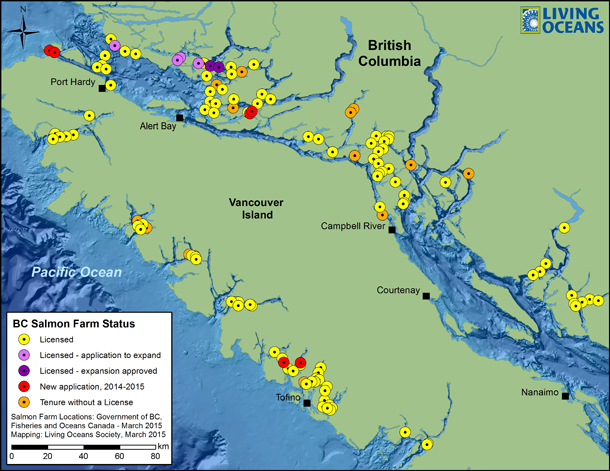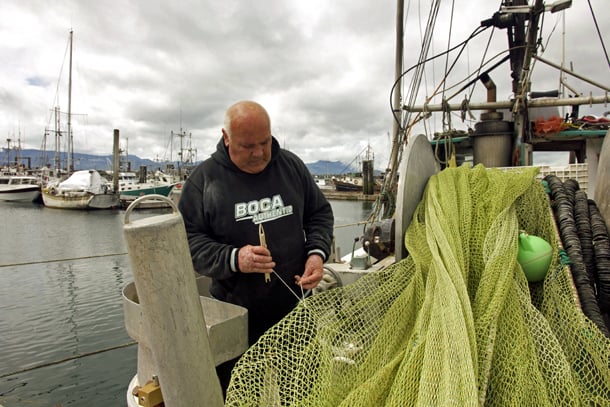A salmon farming company is offering 10 British Columbian fishermen $20,000 each in compensation for its plan to expand operations onto wild shrimp harvesting grounds located off the B.C. mainland, a short sail south from the Vancouver Island fishing town of Port Hardy.
In a June 16 letter from Grieg Seafood BC to the Shrimp by Trawl Caucus, the company offers to pay the cash in "compensation," in addition to a $60,000 lump sum to the caucus, an organization made up of fishermen, processors and buyers.
The offer came shortly after a June private meeting between the shrimp fishermen and Grieg concerning the two salmon farms, which are proposed within two square kilometres of an existing Grieg farm in the Clio Channel in the Broughton Archipelago. Grieg is a subsidiary of a Norwegian aquaculture company.
The fishermen are opposed to the farms because the two proposed sites occupy some of the best harvesting grounds in the region for wild side-stripe and pink shrimp, which are caught by bottom trawling along a soft-bottomed, underwater prairie unique to the upper reaches of the Channel. It's also an important harvesting area for spot prawns, an increasingly lucrative "foodie" commodity in B.C. and beyond that are sustainably caught in traps.
Lorne Clayton, chair of the caucus, says none of the 10 fishermen to his knowledge has accepted the written offer. He has personally rejected the $60,000, which Grieg intended to help fund new LED lighting technology to minimize the unintended landing of by-catch by the trawlers. The fishermen fear that the two new farms in the area, including underwater infrastructure, will limit access to the rich wild shrimp harvesting grounds and ultimately slash their bottom line.
"The overall issue at stake here is taking the income away from individual fishermen and their families, and replacing that with an opportunity for a multinational company," Clayton says.
Stewart Hawthorn, Grieg Seafood's BC managing director, says the choice of new sites was dictated in part by the existence of two pre-existing, unused shellfish farm licenses that the company holds and is now applying to convert into salmon farms. The acceptance of the locations by a local first nation was another factor.
When it comes to approving the two new farms, the final analysis should boil down to economics, Hawthorn says. The entire wholesale value of the shrimp-by-trawl fishery, including outside the channel, is about $1 million a year, while Grieg's annual landings from their single farm at Bennett Point is around $10 million. "Clearly our economic benefits are much greater," he says.
Approval process ongoing
The company's offer comes in the midst of a regulatory process: for the two farms to proceed, Fisheries and Oceans Canada must sign off on the aquaculture licenses, Transport Canada must weigh the marine traffic implications, and the provincial government must approve the tenures as it owns the seabed. Fisheries and Oceans Canada refused to comment about Grieg/fisherman discussions that are "internal to those parties," and the province did not respond to calls.
Karen Wristen, executive director at Living Oceans Society, says the approval process for the two farms has been confusing from the beginning. Grieg is attempting to convert unused shell farm licenses into salmon farms that would hold half a million fish at each site, contained in large net cages anchored to the seabed. (For a visual, that's the same collective biomass as nearly 1,000 adult elephants on land).
Clio Channel is home to at least three commercially-targeted wild shrimp species, inter-tidal clam beds, herring, and wild pink, chum and coho salmon. Living Oceans Society claims that Grieg provided no inventory of local streams that may be salmon-bearing with its initial application submissions for the new farms. That's important, Wristen says, because stocking a million densely-packed farmed Atlantic salmon into this small area has the potential to draw together large concentrations of sea lice that in turn can infect and kill young wild salmon present outside the farms. "We know this channel is certainly used by wild salmon, because it's a popular sport fishing area," she says.
Watershed Watch Salmon Society's Stan Proboszcz, a biologist who has done field work in Clio Channel, says additional impacts could come from emamectin benzoate, the active ingredient in a product called Slice -- a neurotoxin discharged into marine waters to control sea lice parasites on farmed fish. Sea lice and shrimp are crustaceans alike, so the impacts of introducing Slice in close proximity to commercially-harvested wild shrimp and prawns are not yet clear.
Hawthorn confirmed that Slice will be used at the two new farms if necessary, but says there is no evidence that sea lice from such operations pose any risk to wild salmon. He says his company has provided detailed information on wild salmon present in the area (including natal streams), but confirmation of this was not possible because the Ministry of Forests, Lands and Natural Resource Operations webpage that houses the Grieg applications was down as of this writing.
The timing of a regulatory decision for the two farms is uncertain, but it seems many more are on the way. Last year the BC Salmon Farmers Association announced plans to expand its operations off the B.C. coast by over 40 per cent by 2020. There are currently at least six new salmon farm tenure/license applications and five additional applications for tenure/license expansions in various stages of the regulatory approval process. In the last week, two more applications have appeared for an area north of Klemtu.

Murray Tanner, who has been fishing salmon since he was eight and shrimp for nearly 30 years (he's 65 this year), says Grieg's existing Bennett Point fish farm has already had an impact on his shrimp fishery. Anchoring lines from the farm radiate out in every direction for "a few hundred yards" in the narrow channel, he says, making the task of accessing the shrimp with trawl gear, which scours the ocean bottom, impossible in the area.
Tanner says that three farms in Clio Channel will not only take away valuable shrimp ground for the fishermen, but will impact the bottom line of their Nanaimo-based processor, which employs staff to peel and process their shrimp. He says he turned down the compensation.
Grieg has worked hard to accommodate the fishermen, says Hawthorn, including shortening the anchors which interfere with their trawling gear, providing info about where the anchors are, and offering cash compensation. "We believe strongly that both our aquaculture fishery and the shrimp-by-trawl fishery can coexist side by side," he says. ![]()
















Tyee Commenting Guidelines
Comments that violate guidelines risk being deleted, and violations may result in a temporary or permanent user ban. Maintain the spirit of good conversation to stay in the discussion.
*Please note The Tyee is not a forum for spreading misinformation about COVID-19, denying its existence or minimizing its risk to public health.
Do:
Do not: